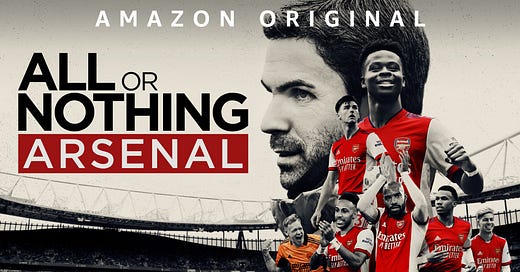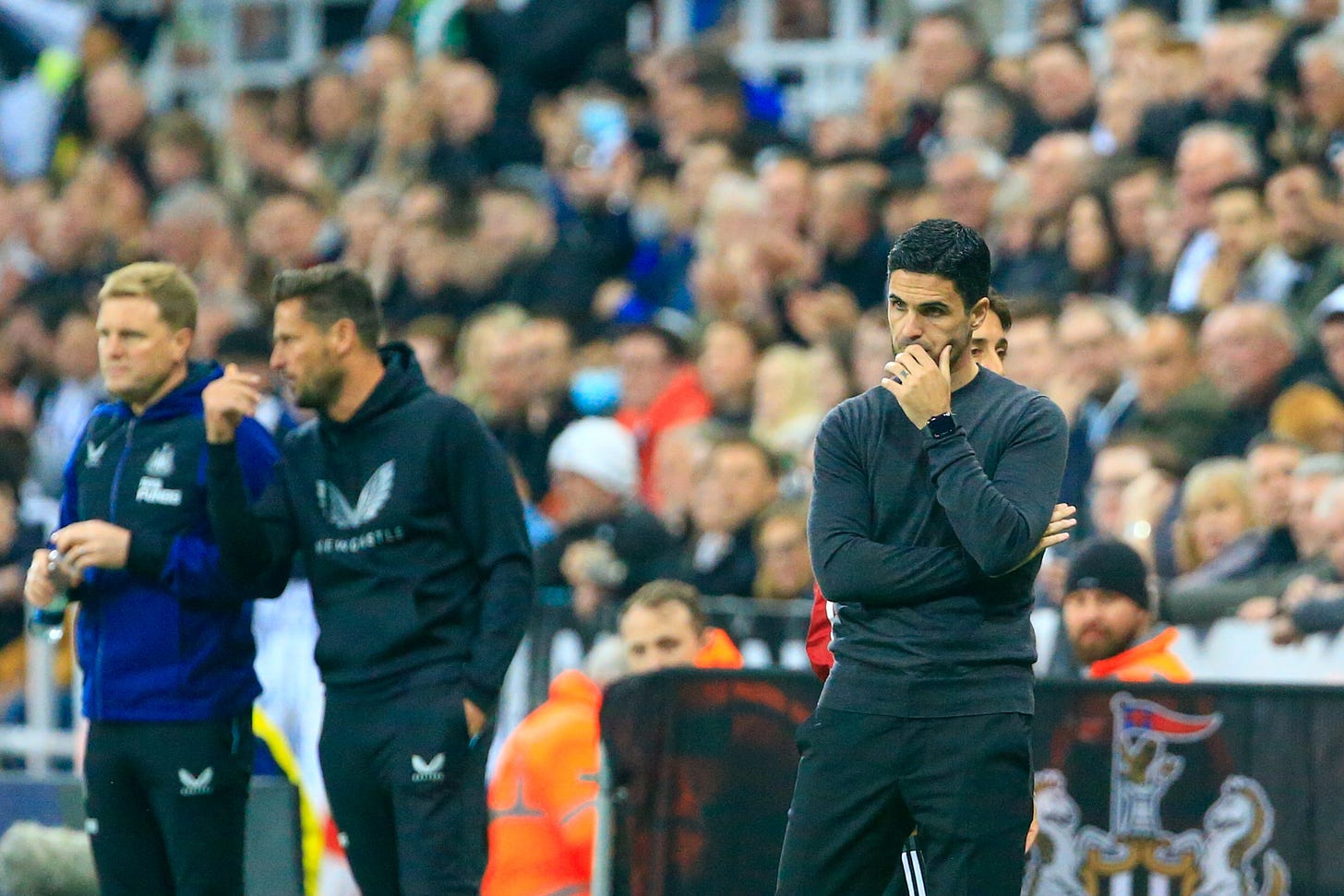All or Nothing: Arsenal tells us more in what it does not show
Some will be left disappointed again but the lack of grit in this glossy production
I remember being particular giddy with excitement at the age of nine when a documentary about Chelsea was released. It was the autumn of 2007 and it was called Blue Revolution.
Produced by Abbey Road Interactive, this very much was an in-house film, one with the firm blessing of the club and to outsiders, I am sure would fall under the umbrella of PR. It documented the early years of the Roman Abramovich era, showcasing how a club in financial peril would rise to the summit of the domestic and European game within a couple of years.
Paolo Nutini’s ‘New Shoes’ perfectly synced over an upbeat intro, matched with the now Chelsea icons of the mid noughties
What Blue Revolution had in its favour was it based itself amongst Chelsea supporters. Throughout the behind-the-scenes looks which most infamously included the Jose Mourinho speech to his players telling them “they cannot lose”, we followed this journey with season-ticket holders, a US-based fan who had his own punk-band, the owner of a local pub close to the Bridge.
As glossy and pampering this could have been accused of being to the cynics, it spoke to those who knew Chelsea.
The frustrating thing about Amazon’s latest entry in the All or Nothing series, is how little we get to know Arsenal supporters and their extensive feelings, despite being exploited frequently when the show needs them to drop an emotional line or expression.
Coming from a rival POV as a Chelsea fan, I have enjoyed the previous additions of these. The one with Manchester City showed us the forging of a title-winning machine and time with one of the greatest coaching minds in sporting history.
The Spurs one had little highs but again offered small moments of intrigue with interactions between Dele Alli and Mourinho top of the bill in a tense exchange.
Although we are only six episodes into the Arsenal entry, we are swimming in similar waters here. If you approach this hoping for the gritty realism of Netflix’s Sunderland Till I Die, you will be gravely disappointed.
It is made abundantly clear in the opening 10 minutes of this show where the focus lies, and it is not amongst those who sit in the stands. The swift brushing over of the European Super League protests felt particularly symbolic, as was the quick overview of the current ownership, who have faced consistent opposition from those who love Arsenal over the past decade.
Little tells us why Arsenal fans were enraged enough to fill the space around their stadium in April of 2021. Why the ESL caused such a seismic backlash across English football. If this had been a Chelsea series and Amazon had brushed over the protests outside Stamford Bridge, that would have been a glaring omission.
In the first episode we seem to consistently take breaks in order to detail abusive tweets aimed at either players or Mikel Arteta.
Either intentional or not, the series seems to make a link between online abuse and TalkSport as during one of these montages the voice of Jamie O’Hara can be heard shouting “banter club” as dramatic background music plays and screenshots of tweets flash up.
You fear these breaks to be reminded of the toxicity on social media will become a regular occurrence, luckily they are not (at least for the episodes we’ve seen so far). Though they do reflect a pretty nasty reality that spills out from the keyboard into real life.
After an early defeat to Chelsea, we see fans aggressively interrogating Arteta at the window of his car as he tries to drive away. After, we see a conversation between Edu and Vinai Venkatesham, Chief Executive Officer of Arsenal. Both just shrug the outrage off as the realities of managing a big club.
It could be easy at this point to specifically berate the toxic sides of Arsenal fandom, but we can all see shades of this in our own clubs, particularly if you support one of the big English ones.
Photo by MB Media/Getty Image
We threaten to nail down on this growing abuse online and the aftermath on young footballers – be that Bukayo Saka after his penalty miss at EURO 2020, or Aaron Ramsdale after signing. But we quickly move on, a trend that represents how far the curtain is willing to be raised for those peaking in.
On several occasions there are glimpses of something deeper, something more substantial wanting to come out. But it is ripped away from us.
Another moment that speaks to the lack of depth is when we view a tactical meeting at Colney between Arteta and his players. The coach lays out the positions his players take up during a game, the players are then tasked with remembering where they are supposed to be.
This is done more to show light-hearted clips of the players forgetting rather than giving us any greater picture of how Arteta views football and his tactics.
The after-effect of this is that his rousing dressing room speeches make the role of elite Premier League coach look no more complex than Football Manager.
Humour will be had at the “David Brentisms” of Arteta taking out speakers to play “You’ll Never Walk Alone” before an away trip to Liverpool. Or in the reverse game at home basing his pre-match speech to recall the night he met his wife at a night club. We then cut to shots of players looking particularly confused at this dating advice before going out and losing 2-0.
The best parts of all All or Nothing, as in the previous two series, are interactions between players. Those human moments, lesser known staff gaining a spotlight. The infectious joy of Bukayo Saka, Ramsdale’s parents coming to watch his debut, Arteta’s home life.
It should never be needed to remind everyone that the people involved in football are human beings, but such grounding feels a distance from the over-dramatised and highly cynical culture that dominates in the media.
But even if we may criticise a lack of depth or gritty realism, do we really want the curtain pushed back any further? Would we take it responsibly or use it as a stick to beat participants with when there’s a bad defeat down the line? Even the struggles of Nuno Tavares felt particularly vulnerable after a difficult evening at Anfield. How would the reaction be if a major player admitted to suffering from anxiety in a world that craves unrelenting “mentality monsters”?
That is maybe why clubs hold us at an arms length, they can be criticised for communicating in bland PR-speak, but their own guard has probably be raised due to the cluster fruitcake of social media, the constant outrage, the 24/7 coverage.
Nothing here ever comes close to hitting home like one of the final lines of Sunderland Till I Die following a heartbreaking play-off final defeat to Charlton at Wembley.
"Why is it never us celebrating? Why is it never us?” let out by a tearful fan.
Little can hit the seemingly never-ending misery of Sunderland during that period and the impact on its community. This is Arsenal, a global brand with superstars, a modern arena and pristine training ground. This is as much an exercise in furthering the brand as it is a “documentary”.
At times it feels like the antagonists of the series to Arteta and his players are not their opponents on the pitch, but those watching on. Again used to communicate either extreme happiness or firm condemnation.
I am sure for Arsenal fans this is a nice peak into their club and the players they follow, for outsiders it gives enough to keep you watching with its high-production value and sharp editing.
But I doubt many will come away from this with any greater appreciation over what makes Arsenal any different to the clubs already covered by Amazon, other than the results on the pitch or some clips that will soon be turned into memes.
Thanks for reading. Check out my videos on Chelsea on my YouTube channel, and read more of my work at football.london






